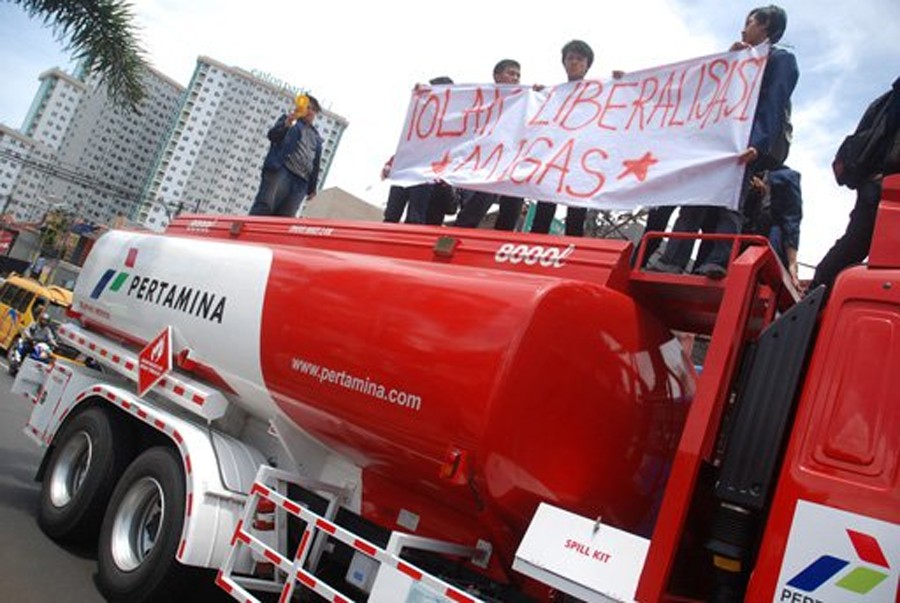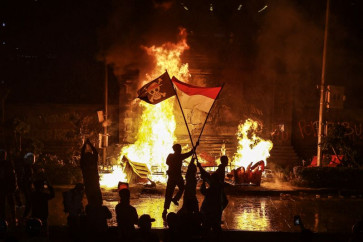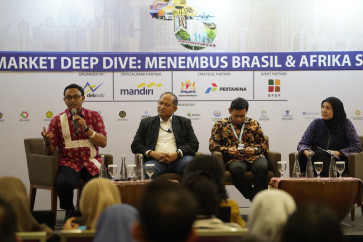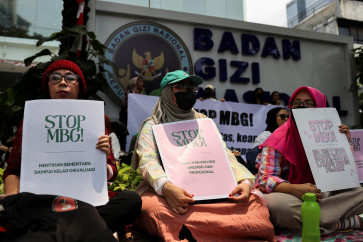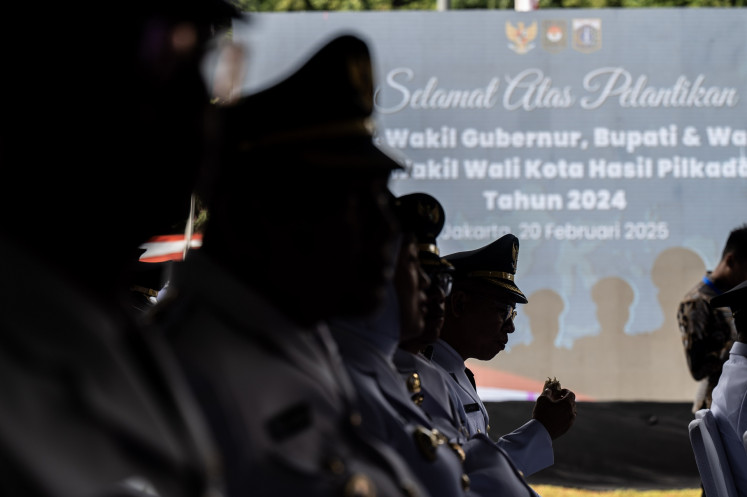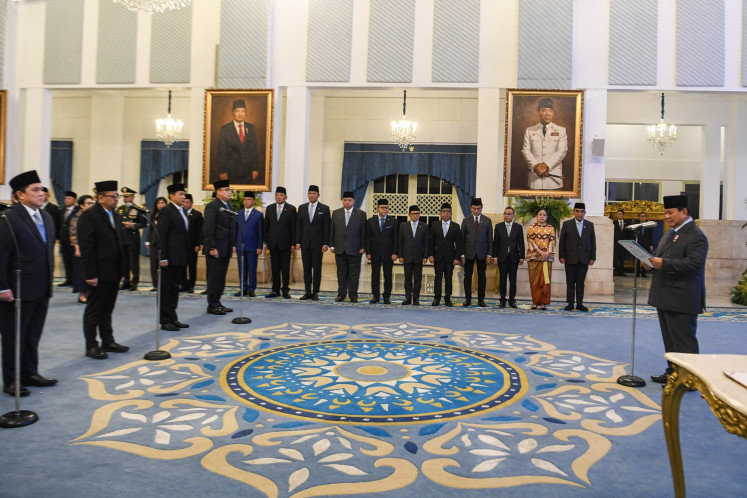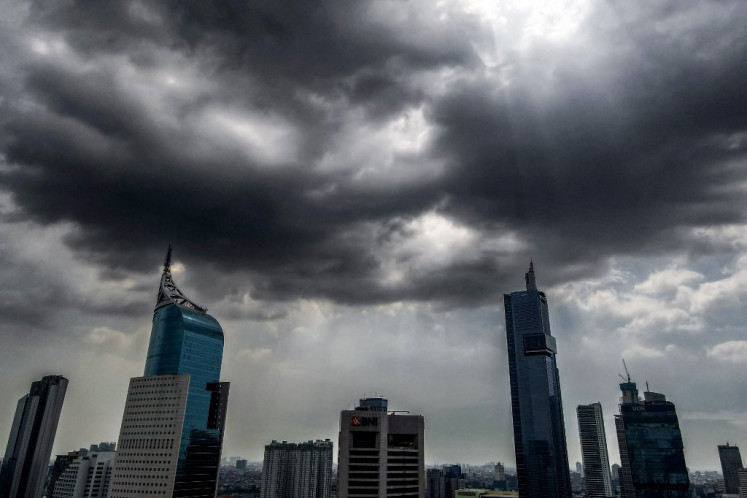Popular Reads
Top Results
Can't find what you're looking for?
View all search resultsPopular Reads
Top Results
Can't find what you're looking for?
View all search resultsNew fuel policy short sighted
Change text size
Gift Premium Articles
to Anyone
T
he government’s move to reduce fuel prices in Papua and West Papua may have been well-intended, but poorly thought out, analysts have warned.
President Joko “Jokowi” Widodo announced on Tuesday the commencement of a one-price policy, which will lower fuel prices in the country’s easternmost province to the same level as those in Java and other regions.
The new policy will allow locals to buy premium gasoline for Rp 6,450 (49 US cents) per liter, diesel for Rp 5,150 per liter and kerosene for Rp 2,500 per liter.
Experts were not enthusiastic about the announcement and have cast doubt on the sustainability of the one-price policy.
Institute for Essential Services Reform (IESR) executive director Fabby Tumiwa said the government had good intentions, but it was only a short-term solution at best.
Fabby questioned whether the government had considered the possibility that subsidized fuel demand would increase exponentially as the cheaper prices would change consumer behavior in the region.
“Will demand increase? Of course it will. Locals could afford to buy fuel at Rp 50,000 per liter before,” he told The Jakarta Post on Wednesday, adding that they would most certainly be able to buy the fuel at an “87 percent discount”.
ReforMiner Institute researcher Komaidi Notonegoro said the implementation of the one-price policy was odd, especially since the government had long planned to reduce sale of subsidized fuel in order to save money.
“The government has to seriously think about how this will affect the country’s fiscal situation because the policy will affect the state budget,” he said.
It is estimated the huge price gap will burden Pertamina with additional spending of Rp 800 billion. Most of the costs will come from air transportation to its distributors located in eight regencies in Papua and West Papua.
Pertamina uses an air tractor operated by subsidiary Pelita Air to transport the fuel. The aircraft is capable of transporting 4,000 liters of fuel per flight.
Pertamina insists it is not overly concerned about the new policy. Pertamina finance director Arief Budiman said the company’s finances would remain stable as it could cross subsidize any potential losses from the company’s other businesses.
“In general, [Pertamina’s] finances will still be in a good condition,” he said.
Pertamina marketing director Ahmad Bambang cited non-subsidized fuel, subsidized industrial fuel, lubricants, non-subsidized liquefied petroleum gas (LPG) and petrochemicals as sectors that may possibly be selected to cross subsidize the low-cost fuel.
Jokowi’s announcement enthralled locals and Bintang Mountain regent Costan Oktemka. Costan said he would soon issue a regulation prohibiting the sale of premium and diesel at more than Rp 10,000 per liter.
Although Pertamina supplies the Bintang Mountain regency with 75,000 liters of premium and 25,000 liters of diesel per month, prices remain high because of the difficulties in transporting to the Oksibil district.
However, despite Pertamina’s denials, the company may still feel the pinch. Last year, Pertamina’s revenues dropped significantly by 40.3 percent to $41.76 billion from $70 billion in 2014.
It attributed the revenue plunge to falling oil prices. Last year saw prices of both West Texas Intermediate (WTI) and Brent Crude sink to their lowest levels of around $30 per barrel.
The Energy and Mineral Resources Ministry said it was prepared to recalculate the alpha — the distribution costs and margin set by the ministry — of subsidized fuel in order to lighten Pertamina’s burden.
“We will calculate the alpha again so that it does not burden anyone,” the ministry’s director for downstream oil and gas business guidance, Setyorini Tri Hutami, said.
Up to Rp 94.4 trillion was allocated in the revised 2016 state budget for fuel and LPG subsidies. The government has proposed Rp 92.2 trillion to be allocated in next year’s draft state budget.
Meanwhile, Fabby recommended that in the long run, the government should start looking at non-petroleum fuel sources that could be developed locally in order to minimize the regions’ reliance on subsidized fuel.
Furthermore, more renewable energy-fueled power plants needed to be built in Papua and West Papua, instead of the more widely-used diesel, he said.
__________________________
To receive comprehensive and earlier access to The Jakarta Post print edition, please subscribe to our epaper through iOS' iTunes, Android's Google Play, Blackberry World or Microsoft's Windows Store. Subscription includes free daily editions of The Nation, The Star Malaysia, the Philippine Daily Inquirer and Asia News.
For print subscription, please contact our call center at (+6221) 5360014 or subscription@thejakartapost.com

